Next month sees Steve Orlando launching a new #1 title at Image – a new take on the Atlantis myth called Undertow, with artist and colourist Artyom Trakhanov. This is a different take on underwater life than anything you might have been expecting, however – the creative team have revamped Atlantis as a centre for a decadent ruling class, whilst unevolved humans run wild and uncontrolled on land.
Following a band of dissident rebels as they try to forge their own path away from Atlantis, the series starts this February, and Steve was kind enough to talk me through the new book, the politics involved, the design aesthetic – and we even got to speak a little about his recent Kickstarter success, Virgil!
(This also marks my first time interviewing another Steve – so I’ve decided to be Beat (or beta) Steve here!)
Beat Steve: Undertow is a story about characters who have escaped Atlantis and made their own path, away from the mainstream, coddled lifestyle that Atlantis brings. How did the concept of the book come together, for you?
Steve: I wanted to bring Atlantis into the present day! It struck me that most take on Atlantis seem to show it as a king and kingdom, monarchic society with the culture and technology to go with it. But if our world evolved past swords, kings, and peasantry, why wouldn’t this one? For our characters, those worlds, the Namor and Arthur Curry worlds, are ancient history. Sure they may have happened, but that was a long time ago.
I wanted to see where those underwater worlds would be today. I wanted to invent a metropolitan world with the tech and emotions to go along with it. By taking what’s going on in our world and adapting it for underwater life, every facet of human life became fresh. Each time I took something from our world, I had to sit back and rethink it, think, “how would they do that? could they do that?”
Beat Steve: Do you start with characters or with concept, as a writer? Anshargal, the lead character of the first issue, comes across as somebody you’ve had in mind for a while before he slotted into this series?
Steve: Undertow began with the concept- a modern, fully advanced Atlantis. At the time, it was a muddier mystery, starting with the image of a dead body in the center of downtown Atlantis. Law & Order: Water, if you will. But it grew past there. When I realized it was about exploration and pioneering, Anshargal came together.
He was a modern Nemo – a criminal and terrorist to some, a liberator and freedom fighter to others. He’s the Clint Eastwood of caring – understanding and open minded in the most aggressive, granite way possible. I like the contradictions in his life- a genius, quiet, introverted soldier. The toughest love dad ever.
Beat Steve: The characters are distinctly unhuman, and yet they retain aspects of recognisable humanity in them. When you enter a story like this, with characters who aren’t human, is it difficult to have them be relatable?
Steve: I don’t think so at all! The key is that emotions are what make us human, our drives and passions. It’s not what we look like. And that’s what’s fun about a book at this. These lives are alien, but suddenly we see we can relate to our characters. Suddenly we identify with these jealous, passionate, horny, prideful, emotional alien fish people. People don’t have to look human to be human.
Look at THE ELEPHANT MAN, look at AVATAR. Or the LION KING. Stories can be human as hell, without anyone that looks, or is, human present. When you remember why we do what we do, it’s easy to throw that into anybody you like.
Beat Steve: The most striking thing about this take on Atlantis is how developed they are. Typically we see Atlantis in stories as being this big old-fashioned place filled with palaces and court jesters and so on. Why develop Atlantis into a modern, developed world power?
Steve: Because it gives them more problems! We’ve seen how medieval courts work with underwater life needs. But Atlantis could be so much more. It’s a murky mirror for our own society. And switching the point of view on what’s normal and what isn’t shows us just how weird we can really be. It makes the weirdness of humanity more noticeable. It’s fiction knocking on our door. After years of mimicking our past, it’s time for Atlantis to reflect our present.
Beat Steve: Do you enjoy the world-building aspects of putting together a series like this?
Steve: Absolutely. Making things layered and dirty is how it gets texture and reality. If a world is going to be real, you have to be able to answer everything anyone could ask. You will find out how Atlanteans eat, how they go to the bathroom, how they fight, how they watch television, sleep while they’re buoyant. Even how they don’t explode when they come to the surface.
The best part was adapting the actual oddities of the deep and using their amazing abilities in our characters, The line between fiction and science fiction doesn’t always fall where you’d expect, and the more I researched for this world, the more I found strange creatures that were all too real and all too amazing that I had to work into daily Atlantean life.
Beat Steve: You’ve worked often with artist Artyom Trakhanov, who brings a particularly unearthly feel to his designs and page layouts. How did you meet?
Steve: I met Artyom when I found his amazing webcomic Mad Blade, which he still works on in addition to this book, in Russian. I thought the work was amazing, and had been searching for more Russian comics for a long time. I emailed and he took pity on my Muscovite, middle school level Russian and decided to collab on some short stories.
After a cannibal angel western and a time travelling love/hate story, we decided to try something longer, and Undertow was a hit as soon as I mentioned it to him. He understands my crazy better than most!
Beat Steve: Collaboratively, how involved do you get with design? The book is filled with strange (and strangely functional) equipment and architecture and clothing.
Steve: I give tone and scale notes in the script, along with some more specific notes on characters. BUT like the pirate’s code, they’re more guidelines than actual rules. Even actor or historical figure comparisons are more for tone, and then I let Artyom do his work.
Artyom has such powerful ideas for what the book is and what it looks like. I knew the Deliverer would be huge, but he is the one that made it like an enormous animal, with rooms like body cavities and machines like organs. I knew I wanted to use Apergy, an anti-gravity energy from an 1880s Sci Fi novel ACROSS THE ZODIAC, but when I told Artyom he was even more excited than me. He was the one that decided how it worked, how it visually flowed through the tech that uses it.
With an incredible artist like him, I just plant a small seed and he goes crazy.
Beat Steve: Politically the book is fascinating, making several subtle and overt jabs at consumerism and modern society. How did you handle the series as a political satire?
Steve: Without going too over the top, the book offered a chance to talk about the blindness that happens in a comfortable society. As long as you keep people happy, fat, and distracted by “new and improved,” it doesn’t matter what bad things are happening off-screen. We get a chance to see how dangerous a one-party system can be, and the length people go to, to escape it.
But the thing I wanted to do with all that was to be even minded. We don’t forget that despite some people who are too far gone, there are still good people in Atlantis. And maybe there are some bad people on the Deliverer. There’s no black and white, it’s just a darker grey world than ours. We don’t harp on the problems of the world, so much as use them as a backdrop.
Beat Steve: To what extent do you push the contrast/comparison between Atlantis and, say, America – and when do you hold back?
Steve: I personally don’t think Atlantis is a specific satire of America. I built it to be a satire of more the modern globalized world, and our overall fight to stay relevant in the face of powers that want to distract or lie to us. It’s not just America. It’s a what-if, what if we push our self centrism just a bit more? What if the corruption got worse?
The specific notes we see in Atlantis come from news all across the world, because if it gets as bad as it is in Undertow, that’s the place we have to start taking back our selves, not just one country of another.
Beat Steve: Would you describe yourself as a politicised writer? Undertow certainly has elements of political satire, and your recent Kickstarter success Virgil was intentionally designed to discuss LGBT rights.
Steve: I think any writer likes to put things she or he thinks are important in a book. But I don’t set out to be political. That strikes as too hollow and tunnel-visioned. Books don’t need to be about politics, it’s a more important thing to show how those political actions touch the people, the characters. I don’t think you can have one without the other.
If it’s too on the nose, you’ve got yourself “a very special episode” and that’s no good. With VIRGIL, it certainly has political elements, but like COFFY and SHAFT, the political situation is the background. It’s the catalyst for action. And that’s what we have in Undertow. A broken system, and people so desperate to escape that they’ll tame the untamed world to be free.
Beat Steve: How do you feel about comics as a political medium? As a format, comics offer both a written and visual narrative, which would perhaps make them ideally designed for this sort of work?
Steve: I think any good book has to talk about the times. But comics do offer the advantage of combining text with a visual of the effect. It’s richer, in some ways. It also lets you control the image a reader takes from the words. So it’s a give and take.
With text, a readers mind runs in wild places, maybe not where you hoped, but that’s the beauty of plain text. With comics, you’re in the driver seat a bit more, taking the reader on a tour of your creation. And as for comics being political– I think they always have! From the start you had Superman busting slum-lords, to the Hard Travelling heroes and Roy Harper’s drug problems, to Pedro and Me.
Even action books like WANTED are morbid reflections of Millennial ennui. If you live in the world, you can’t help but speak about it when you create, even if it’s just a little bit.
Beat Steve: You’ve mentioned in interviews that you’ve spent time living in Russia. Do you think that your time living abroad has informed this story, as your own experience outside America mirrors that of your characters and Atlantis?
Steve: I would definitely say so. Living in another culture shows you there’s no one single way for people to live. And once that paradigm is broken, it’s instantly easier to build a new world from the ground up. It certainly shows how people change outside their comfort zone, and how easily we can take things for granted.
Look at today where everyone has internet in their phones – but where I lived, I had to take a 45 minute bus to check my email. Living outside your home country shows you how to truly wipe the slate clean. Which makes it easier to draw on the slate.
Beat Steve: Undertow is a six-issue miniseries, and yet it sets up a vast world which could continue on beyond those six issues. Do you have any plans to continue with the world of Undertow once this story finishes?
Steve: The first arc of Undertow is definitely a complete story, but there are two more instalments to complete the story. In the end Undertow is about unity and hometowns. And by the end of the first storyarc, it’s obvious we have a long way to go before we get there.
Beat Steve: What else do you have coming up in future? Where can people find you online?
Steve: VIRGIL is coming in 2014 as well, just like you said! Just like Undertow is my Ray Harryhausen monster adventure, VIRGIL is my 1970s, 1980s action movie. This is my ode to badass, beaten-to-shit leads like John McClane, with a betrayed cop fighting his way across a city to rescue his man. And there’s always more books coming up after that.
As for me, I can be found on twitter at @thesteveorlando, and my website www.thesteveorlando.com. I also dispense odd thoughts about wine and whiskey there from time to time.
—
Many thanks to Steve for his time! Undertow #1 comes out on the 19th February – pre-order now! Thanks also to Henry Barajas, who set up the interview with me. The Beat misses you, Barajas!
You can find me – I’m Steve Morris! – on twitter here, and writing on t’Vanguard, by ‘eck!


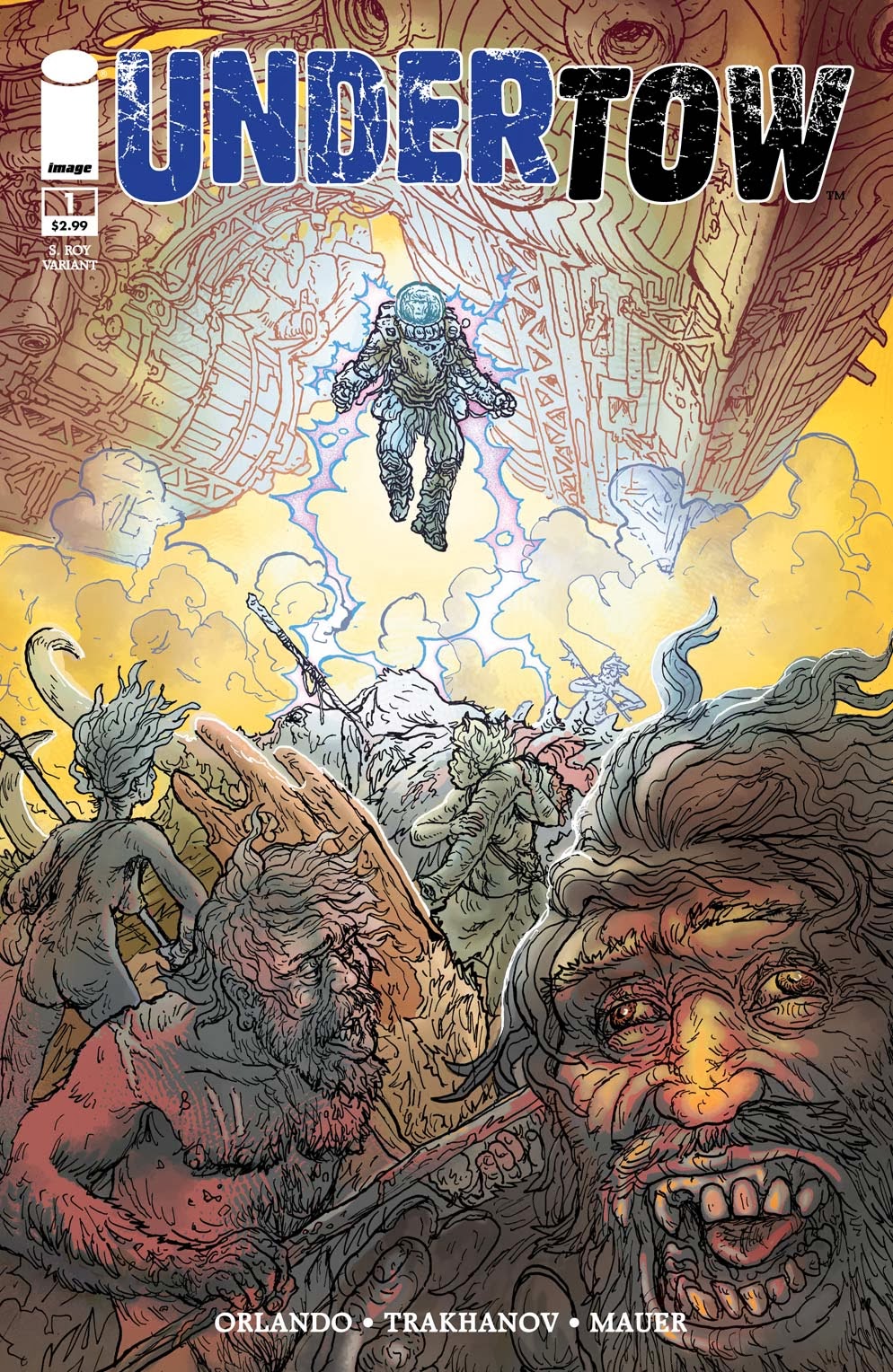
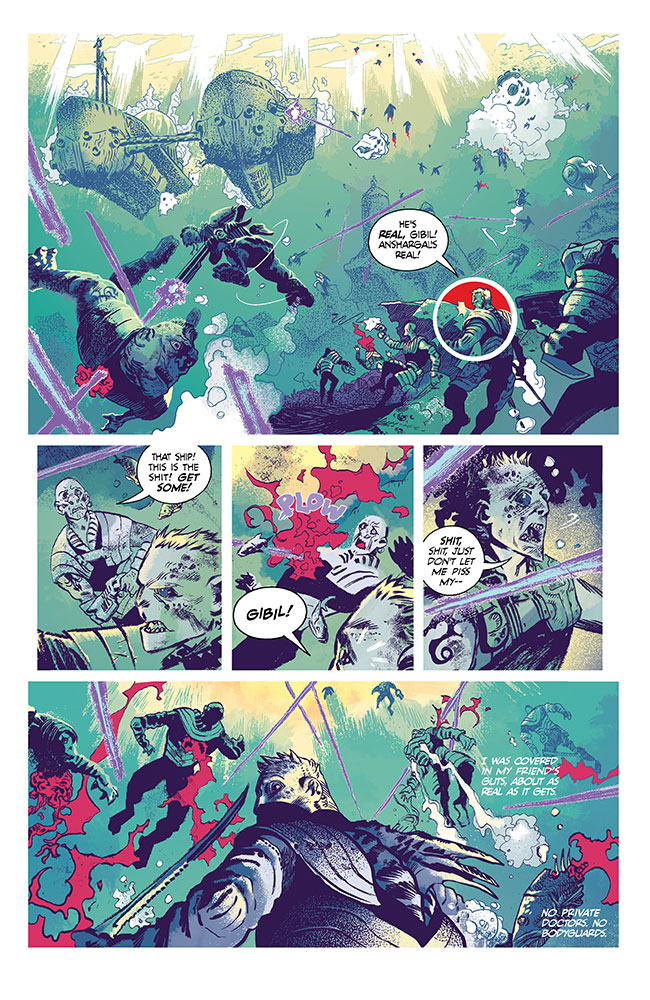
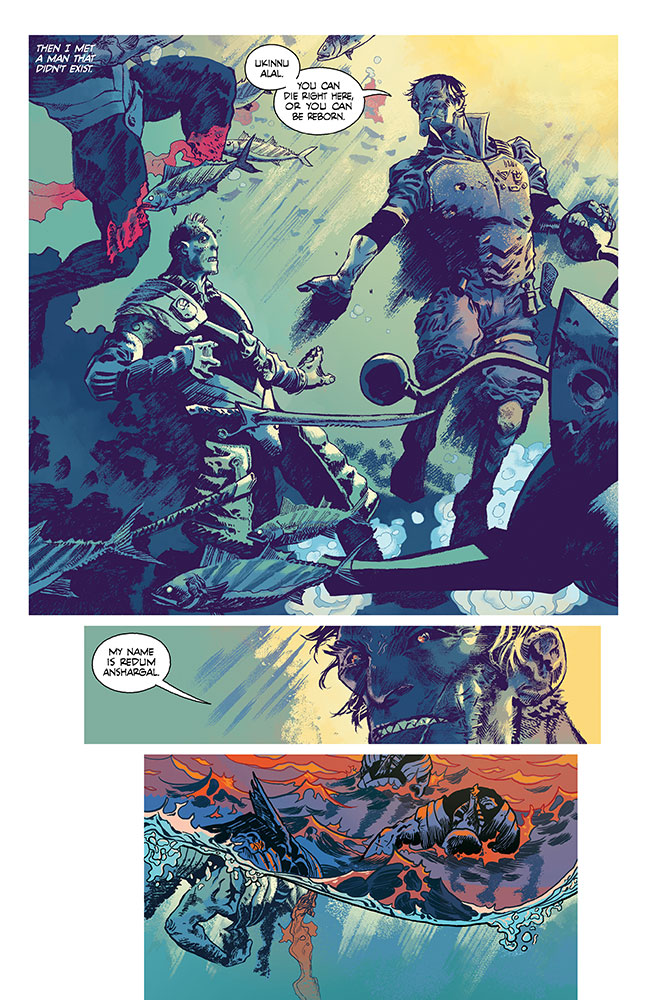
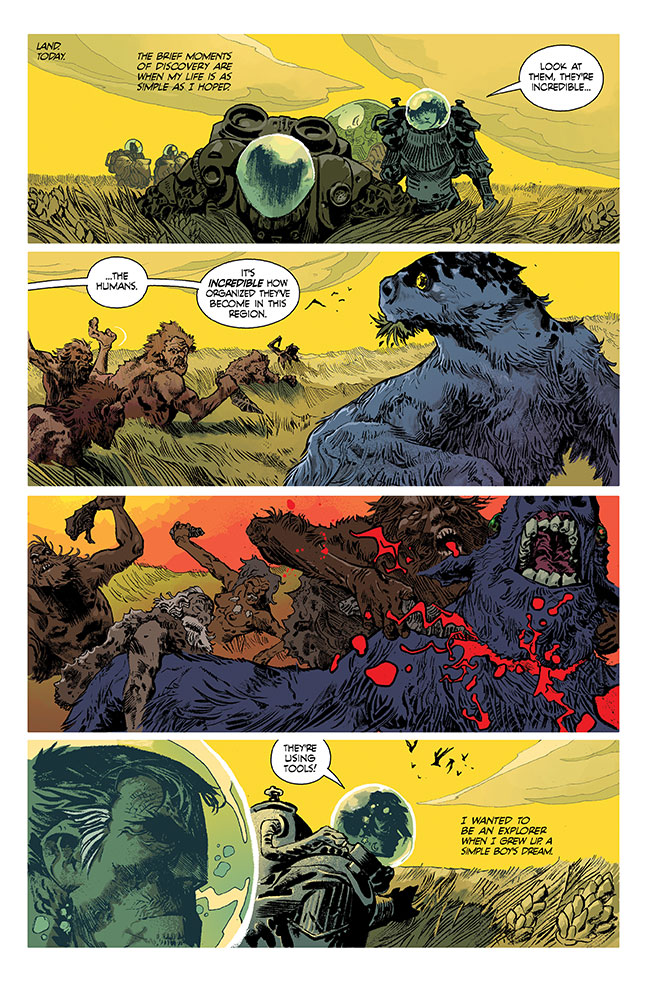
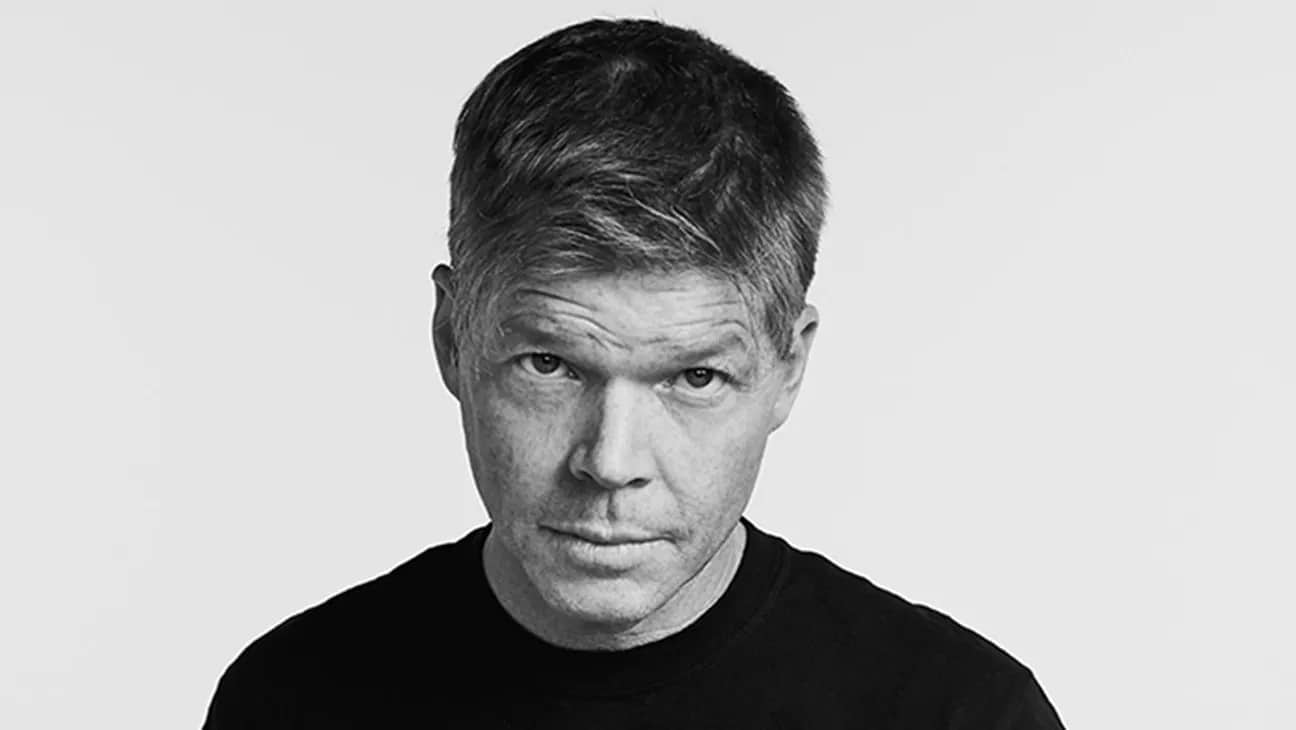

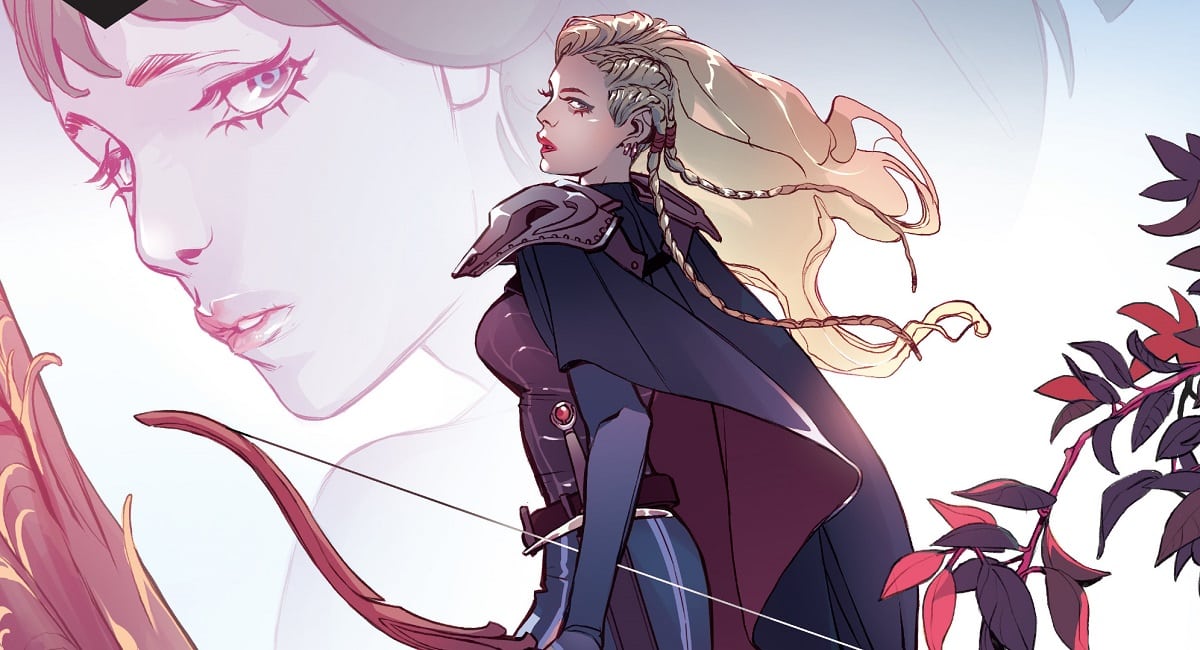


Great interview! I was on the fence about whether or not to pick this series up, but I’ll definitely give it a try now….thanks!
Comments are closed.